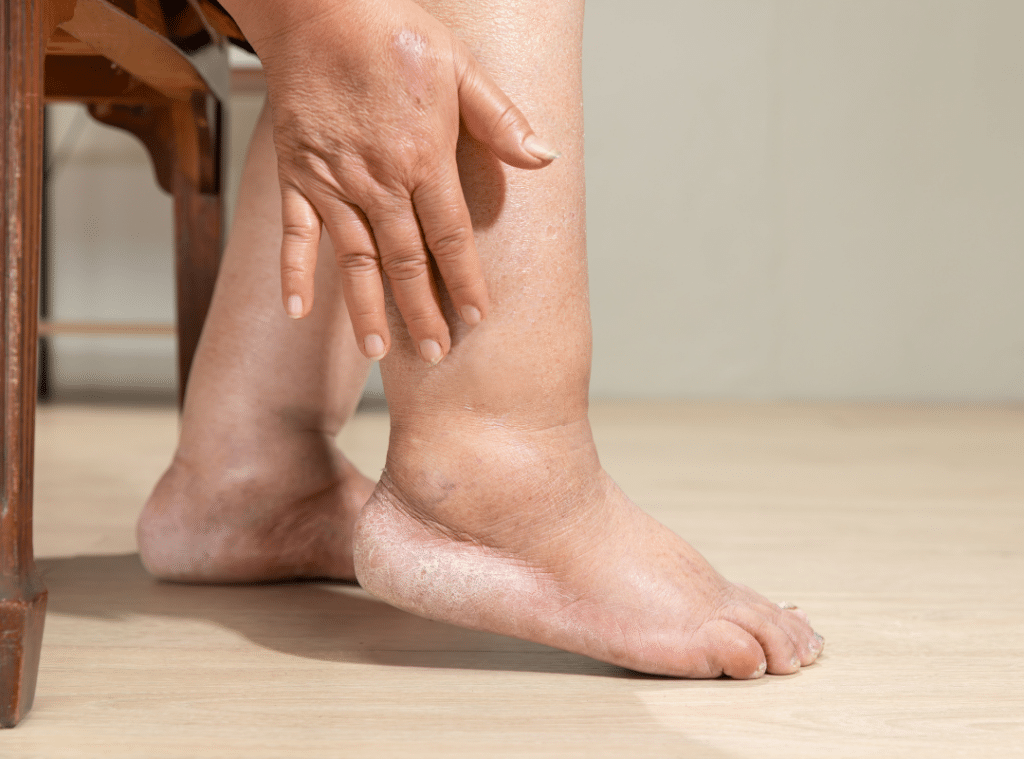Swelling in the feet is a common yet often overlooked health concern among older adults. If you’ve ever wondered what causes elderly people’s feet to swell, you’re not alone. This condition can stem from a variety of factors, ranging from circulatory issues to kidney problems, medication side effects, and lifestyle habits.
Understanding and addressing the causes is vital, especially when it comes to the well-being of seniors. Whether it’s managing swelling in an 80-year-old’s swollen feet or learning what to drink to reduce swelling in feet, this guide offers clarity and solutions to improve comfort and mobility.
Visit Oceanview Senior Living to explore personalized senior care options.
Common Causes of Swelling in the Elderly
Swollen feet are common in aging individuals, often due to fluid retention, restricted mobility, or chronic conditions. Among the primary factors behind what causes elderly people’s feet to swell are heart issues, circulatory disorders like venous insufficiency, and kidney dysfunction.
These issues interfere with proper blood flow and fluid balance, leading to puffiness in the lower limbs. In particular, 80-year-old swollen feet may signify deeper underlying health concerns that need prompt attention.
Maintaining healthy skin hydration helps manage symptoms, while daily activity, leg elevation, and compression socks offer preventive care.
Are Swollen Feet Dangerous?
Many seniors ask, Are swollen feet dangerous? The short answer is yes, especially when left unaddressed. Persistent swelling, or edema, may indicate serious problems like congestive heart failure, blood clots, or kidney disease.
Swelling can also increase the risk of skin breakdown, infection, and decreased mobility, further affecting overall quality of life. It’s important to identify the root cause to apply the right treatment for swelling in legs and feet and avoid complications.
Consulting a healthcare provider ensures proper diagnosis and may prevent more serious issues down the road.
Medications and Their Impact on Foot Swelling
A lesser-known but common contributor to swelling is medication. Drugs such as steroids, antidepressants, and calcium channel blockers often cause fluid buildup in the feet.
When exploring what causes elderly people’s feet to swell, review any recent changes to medication, especially if symptoms appear soon after. It’s essential to consult your healthcare provider about side effects and alternatives.
Pairing medical guidance with daily foot elevation and compression gear can ease discomfort. Learn how cold symptoms can interact with medication, and how this may indirectly affect swelling.
Circulatory Issues and Swollen Feet
Poor circulation is a major reason elderly people’s feet swell. Vascular issues like peripheral artery disease and venous insufficiency reduce blood flow, leading to fluid pooling in the feet.
Seniors may notice swelling after prolonged standing or inactivity. Encourage light walking, gentle leg exercises, or stretching to stimulate circulation. Using compression stockings and elevating the legs above heart level can also help.
For those with chronic pain or mobility issues, personalized pain management strategies can support both comfort and functionality.
Heart Conditions Contributing to Swelling
Heart health plays a critical role in fluid balance. Conditions like congestive heart failure directly impact how blood circulates and fluids are processed.
One of the key answers to what causes elderly people’s feet to swell is poor cardiac function. If the heart can’t pump efficiently, fluids build up in the extremities.
Lifestyle adjustments such as reducing sodium, increasing movement, and understanding arthritis management and healthy eating habits can significantly reduce swelling.
It’s crucial to monitor symptoms and work with a provider to manage medications and create a heart-healthy routine.

The Role of Kidney Health in Foot Swelling
The kidneys regulate fluid balance, and dysfunction can lead to excess fluid in the body. Swollen feet are one of the visible signs of kidney issues in older adults.
When kidneys fail to eliminate fluid efficiently, it collects in the lower limbs. This is often overlooked when evaluating what causes elderly people’s feet to swell, yet it’s a key contributor.
Explore how kidney health connects to overall wellness.
Kidney Function and Swelling
In aging adults, compromised kidney function results in poor fluid regulation. Swelling due to kidney problems is a signal to act quickly.
Monitoring kidney function through regular blood and urine tests is essential. Addressing dietary needs, such as reducing salt and staying hydrated, helps support the kidneys’ role in preventing edema.
Fluid Retention Mechanisms
Edema stems from fluid not being filtered properly by the kidneys. This retention causes the feet and ankles to swell, particularly in those aged 80 and up.
To manage fluid retention, hydration is key—yet it’s also important to know what to drink to reduce swelling in the feet. Herbal teas like dandelion root tea and water with lemon are natural diuretics that may support fluid balance.
WebMD – Swollen Feet and Legs offers additional insights into fluid retention causes.
Monitoring Kidney Health
Routine check-ups are vital for seniors, especially those who experience frequent foot swelling. Keep a close eye on swelling patterns, especially if both feet are affected equally.
Healthcare providers may recommend dietary changes and medications that assist with fluid balance and kidney support.
Importance of Proper Foot Care for Seniors
Maintaining foot health isn’t just about comfort—it’s about preserving independence. Older adults should follow a consistent care routine to prevent and manage swelling.
Daily Hygiene Practices
Wash and dry feet thoroughly each day. Apply a moisturizing lotion and inspect for signs of cracks or infections. Well-fitted footwear is essential, as it prevents pressure points that can aggravate swelling.
Daily foot care routines also help detect early warning signs that something isn’t right.
Regular Foot Inspections
Especially for those 80 and older, foot inspections should be part of the daily routine. Look for any changes in color, size, temperature, or new sores. Swelling in one foot versus both can signal different medical issues.
If swelling persists, seek medical guidance right away.
Effective Management Strategies for Swollen Feet
To manage foot swelling effectively, take a multi-pronged approach:
- Lifestyle changes: Elevate feet during rest, walk daily, and stretch regularly.
- Compression wear: Use stockings to improve blood flow.
- Hydration and diet: Drink hydrating fluids like cucumber-infused water or herbal teas—great examples of what to drink to reduce swelling in feet.
- Medication review: Identify any prescriptions causing side effects.
- Medical care: Consult professionals for long-term strategies or treatment for swelling in legs and feet that may involve diuretics, physical therapy, or even surgery in advanced cases.
Healthline – How to Reduce Leg Swelling provides a comprehensive list of treatments and prevention tips.
Take Control of Swollen Feet in Seniors
Understanding what causes elderly people’s feet to swell is the first step in creating a safe, comfortable, and mobile lifestyle for seniors. Whether you’re caring for someone with 80-year-old swollen feet or experiencing symptoms yourself, proactive measures can make a world of difference.
Remember to assess whether swollen feet are dangerous, and explore every available treatment for swelling in legs and feet, including dietary changes, and know what to drink to reduce swelling in feet. Through consistent care, early intervention, and lifestyle adjustments, you can support improved foot health at any age.
At Oceanview Senior Living, we are committed to your wellness. Learn more about our community or schedule a tour today to see how we can help you or your loved one enjoy a more comfortable and supported lifestyle.
For immediate assistance, please call us at 541-574-0550.
Dive into the vibrant life our Westmont communities have to offer.Find Where You Belong
Frequently Asked Questions
How do you stop feet swelling in old age?
To prevent foot swelling in old age, it’s essential to elevate your feet regularly, stay physically active, and avoid prolonged periods of sitting or standing. Wearing compression socks can also improve circulation and reduce fluid buildup. A low-sodium diet helps prevent water retention, which can worsen swelling. Additionally, managing underlying health conditions like diabetes or heart disease is key to reducing chronic swelling.
What does it mean when an elderly person’s feet are swollen?
Swollen feet in elderly individuals often indicate fluid retention, which can result from poor circulation, kidney problems, or heart-related issues. It may also be a side effect of certain medications or a result of standing or sitting for too long. In some cases, it can signal a more serious health concern, such as venous insufficiency or lymphedema. A thorough medical evaluation can help determine the exact cause and appropriate treatment.
When should you worry about swelling in your feet?
You should worry about swelling in your feet if it occurs suddenly, is painful, or is accompanied by symptoms like shortness of breath, chest pain, or skin discoloration. Persistent or worsening swelling could indicate heart, kidney, or liver problems. If only one foot is swollen, it may suggest a blood clot or localized infection. It’s best to seek medical advice to rule out any serious underlying conditions.
Does a swollen foot mean heart failure?
Swollen feet can be a symptom of heart failure, especially when the swelling is persistent and affects both feet or legs. In heart failure, the heart can’t pump blood efficiently, causing fluid to build up in the lower extremities. Other symptoms may include fatigue, shortness of breath, and weight gain from fluid retention. While swollen feet alone don’t confirm heart failure, they should be evaluated by a healthcare provider when seen with other symptoms.








